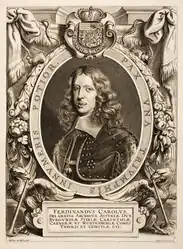| Ferdinand Charles | |
|---|---|
 Portrait by Frans Luycx, c. 1648 | |
| Archduke of Further Austria | |
| Reign | 13 September 1632 – 30 December 1662 |
| Predecessor | Leopold V |
| Successor | Sigismund Francis |
| Regent | Claudia de' Medici (1632-1646) |
| Born | May 17, 1628 Austria |
| Died | December 30, 1662 (aged 34) Kaltern, Austria |
| Spouse | |
| Issue | Claudia Felicitas, Holy Roman Empress |
| House | Habsburg |
| Father | Leopold V, Archduke of Austria |
| Mother | Claudia de' Medici |
| Religion | Roman Catholicism |
Ferdinand Charles (17 May 1628 – 30 December 1662) was the Archduke of Further Austria, including Tyrol, from 1646 to 1662.
As the son of Archduke Leopold V and Claudia de' Medici, he succeeded his father upon the latter's death in 1632, under his mother's regency. He took over his mother's governatorial duties when he came of age in 1646. To finance his extravagant living style, he sold goods and entitlements. For example, he wasted the exorbitant sum which France had to pay to the Tyrolean Habsburgs for the cession of their fiefs west of the Rhine (Alsace, Sundgau and Breisach). He also fixed the border to Graubünden in 1652.[1]
Ferdinand Charles was an absolutist ruler, did not call any diet after 1648 and had his chancellor Wilhelm Biener executed illegally in 1651 after a secret trial. On the other hand, he was a lover of music: Italian opera was performed in his court.
Marriage, children and death
Ferdinand Charles married Anna de' Medici. She was a daughter of Cosimo II de' Medici, Grand Duke of Tuscany and Maria Magdalena of Austria († 1631). They had three children:
- Claudia Felicitas of Austria (30 May 1653 – 8 April 1676). Married Leopold I, Holy Roman Emperor.
- Daughter (born and died 19 July 1654), died at birth.
- Maria Magdalena of Austria (17 August 1656 – 21 January 1669).
He died in Kaltern.
 Bust portrait of Ferdinand Charles, after a painting by Anselm van Hulle. Collection Peace Palace Library.
Bust portrait of Ferdinand Charles, after a painting by Anselm van Hulle. Collection Peace Palace Library. Anna Medici, his wife by Justus Sustermans.
Anna Medici, his wife by Justus Sustermans.
Ancestors
Male-line family tree
| Habsburg | |||||||||||||||||||||||||||||||||||||||||||||||||||||||||||||||||||||||||||||||||||||||||||||||||||||||||||||||||||||||||||||||||||||||||||||||||||||||||||||||||||||||||||||||||||||||||||||||||||||||||||||||||||||||||||||||||||||||||||||||||||||||||||||||||||||||||||||||||||||||||||||||||||||||||||||||||||||||||||||||||||||||||||||||||||||||||||||||||||||||||||||||||||||||||||||||||||||||||||||||||||||||||||||||||||||||||||||||||||||||||||||||||||||||||||||||||||||||||||||||||||||||||||||||||||||||||||||||||||||||||||||||||||||||||||||||||||||||||||||||||||||||||||||||||||||||||||||||||||||||||||||||||||||||||||||||||||||||||||||||||||||||||||||||||||||||||||||||||||||||||||||||||||||||||||||||||||||||||||||||||||||||||||||||||||||||||||||||||||||||||||||||||||||||||||||||||||||||||||||||||||||||||||||||||||||||||||||||||||||||||||||||||||||||||||||||||||||||||||||||||||||||||||||||||||||||||||||||||||||||||||||||||||||||||||||||||||||||||||||||||||||||||||||||||||||||||||||||||||||||
|---|---|---|---|---|---|---|---|---|---|---|---|---|---|---|---|---|---|---|---|---|---|---|---|---|---|---|---|---|---|---|---|---|---|---|---|---|---|---|---|---|---|---|---|---|---|---|---|---|---|---|---|---|---|---|---|---|---|---|---|---|---|---|---|---|---|---|---|---|---|---|---|---|---|---|---|---|---|---|---|---|---|---|---|---|---|---|---|---|---|---|---|---|---|---|---|---|---|---|---|---|---|---|---|---|---|---|---|---|---|---|---|---|---|---|---|---|---|---|---|---|---|---|---|---|---|---|---|---|---|---|---|---|---|---|---|---|---|---|---|---|---|---|---|---|---|---|---|---|---|---|---|---|---|---|---|---|---|---|---|---|---|---|---|---|---|---|---|---|---|---|---|---|---|---|---|---|---|---|---|---|---|---|---|---|---|---|---|---|---|---|---|---|---|---|---|---|---|---|---|---|---|---|---|---|---|---|---|---|---|---|---|---|---|---|---|---|---|---|---|---|---|---|---|---|---|---|---|---|---|---|---|---|---|---|---|---|---|---|---|---|---|---|---|---|---|---|---|---|---|---|---|---|---|---|---|---|---|---|---|---|---|---|---|---|---|---|---|---|---|---|---|---|---|---|---|---|---|---|---|---|---|---|---|---|---|---|---|---|---|---|---|---|---|---|---|---|---|---|---|---|---|---|---|---|---|---|---|---|---|---|---|---|---|---|---|---|---|---|---|---|---|---|---|---|---|---|---|---|---|---|---|---|---|---|---|---|---|---|---|---|---|---|---|---|---|---|---|---|---|---|---|---|---|---|---|---|---|---|---|---|---|---|---|---|---|---|---|---|---|---|---|---|---|---|---|---|---|---|---|---|---|---|---|---|---|---|---|---|---|---|---|---|---|---|---|---|---|---|---|---|---|---|---|---|---|---|---|---|---|---|---|---|---|---|---|---|---|---|---|---|---|---|---|---|---|---|---|---|---|---|---|---|---|---|---|---|---|---|---|---|---|---|---|---|---|---|---|---|---|---|---|---|---|---|---|---|---|---|---|---|---|---|---|---|---|---|---|---|---|---|---|---|---|---|---|---|---|---|---|---|---|---|---|---|---|---|---|---|---|---|---|---|---|---|---|---|---|---|---|---|---|---|---|---|---|---|---|---|---|---|---|---|---|---|---|---|---|---|---|---|---|---|---|---|---|---|---|---|---|---|---|---|---|---|---|---|---|---|---|---|---|---|---|---|---|---|---|---|---|---|---|---|---|---|---|---|---|---|---|---|---|---|---|---|---|---|---|---|---|---|---|---|---|---|---|---|---|---|---|---|---|---|---|---|---|---|---|---|---|---|---|---|---|---|---|---|---|---|---|---|---|---|---|---|---|---|---|---|---|---|---|---|---|---|---|---|---|---|---|---|---|---|---|---|---|---|---|---|---|---|---|---|---|---|---|---|---|---|---|---|---|---|---|---|---|---|---|---|---|---|---|---|---|---|---|---|---|---|---|---|---|---|---|---|---|---|---|---|---|---|---|---|---|---|---|---|---|---|---|---|---|---|---|---|---|---|---|---|---|---|---|---|---|---|---|---|---|---|---|---|---|---|---|---|---|---|---|---|---|---|---|---|---|---|---|---|---|---|---|---|---|---|---|---|---|---|---|---|---|---|---|---|---|---|---|---|---|---|---|---|---|---|---|---|---|---|---|---|---|---|---|---|---|---|---|---|---|---|---|---|---|---|---|---|---|---|---|---|---|---|---|---|---|---|---|---|---|---|---|---|---|---|---|---|---|---|---|---|---|---|---|---|---|---|---|---|---|---|---|---|---|---|---|---|---|---|---|---|---|---|---|---|---|---|---|---|---|---|---|---|---|---|---|---|---|---|---|---|---|---|---|---|---|---|---|---|---|---|---|---|---|---|---|---|---|---|---|---|---|---|---|---|---|---|---|---|---|---|---|---|---|---|---|---|---|---|---|---|---|---|---|---|---|---|---|---|---|---|---|---|---|---|---|---|---|---|---|---|---|---|---|---|---|---|---|---|---|---|---|---|---|---|---|---|---|---|---|---|---|---|---|---|---|---|---|---|---|---|---|---|---|---|---|---|---|---|---|---|---|---|---|---|---|---|---|---|---|---|---|---|---|---|---|---|---|---|---|---|---|---|---|---|---|---|---|---|---|---|---|---|---|---|---|---|---|---|---|---|---|---|---|---|---|---|---|---|---|---|---|---|---|---|---|---|---|---|---|---|---|---|---|---|---|---|---|---|---|---|---|
| [n 1] Original line / Albertinian line / Leopoldian line Max and Philip line / Spanish / Iberian line / Austrian / HRE line
| |||||||||||||||||||||||||||||||||||||||||||||||||||||||||||||||||||||||||||||||||||||||||||||||||||||||||||||||||||||||||||||||||||||||||||||||||||||||||||||||||||||||||||||||||||||||||||||||||||||||||||||||||||||||||||||||||||||||||||||||||||||||||||||||||||||||||||||||||||||||||||||||||||||||||||||||||||||||||||||||||||||||||||||||||||||||||||||||||||||||||||||||||||||||||||||||||||||||||||||||||||||||||||||||||||||||||||||||||||||||||||||||||||||||||||||||||||||||||||||||||||||||||||||||||||||||||||||||||||||||||||||||||||||||||||||||||||||||||||||||||||||||||||||||||||||||||||||||||||||||||||||||||||||||||||||||||||||||||||||||||||||||||||||||||||||||||||||||||||||||||||||||||||||||||||||||||||||||||||||||||||||||||||||||||||||||||||||||||||||||||||||||||||||||||||||||||||||||||||||||||||||||||||||||||||||||||||||||||||||||||||||||||||||||||||||||||||||||||||||||||||||||||||||||||||||||||||||||||||||||||||||||||||||||||||||||||||||||||||||||||||||||||||||||||||||||||||||||||||||||
Notes:
| |||||||||||||||||||||||||||||||||||||||||||||||||||||||||||||||||||||||||||||||||||||||||||||||||||||||||||||||||||||||||||||||||||||||||||||||||||||||||||||||||||||||||||||||||||||||||||||||||||||||||||||||||||||||||||||||||||||||||||||||||||||||||||||||||||||||||||||||||||||||||||||||||||||||||||||||||||||||||||||||||||||||||||||||||||||||||||||||||||||||||||||||||||||||||||||||||||||||||||||||||||||||||||||||||||||||||||||||||||||||||||||||||||||||||||||||||||||||||||||||||||||||||||||||||||||||||||||||||||||||||||||||||||||||||||||||||||||||||||||||||||||||||||||||||||||||||||||||||||||||||||||||||||||||||||||||||||||||||||||||||||||||||||||||||||||||||||||||||||||||||||||||||||||||||||||||||||||||||||||||||||||||||||||||||||||||||||||||||||||||||||||||||||||||||||||||||||||||||||||||||||||||||||||||||||||||||||||||||||||||||||||||||||||||||||||||||||||||||||||||||||||||||||||||||||||||||||||||||||||||||||||||||||||||||||||||||||||||||||||||||||||||||||||||||||||||||||||||||||||||
References
- ↑ Tyler, James (2011). A guide to playing the baroque guitar. Bloomington, Ind.: Indiana University Press. ISBN 978-0-253-00501-4. OCLC 710841731.
- ↑ Ferdinand I, Holy Roman Emperor at the Encyclopædia Britannica
- 1 2 Charles V, Holy Roman Emperor at the Encyclopædia Britannica
- 1 2 Wurzbach, Constantin von, ed. (1860). . Biographisches Lexikon des Kaiserthums Oesterreich [Biographical Encyclopedia of the Austrian Empire] (in German). Vol. 6. p. 352 – via Wikisource.
- 1 2 Wurzbach, Constantin von, ed. (1860). . Biographisches Lexikon des Kaiserthums Oesterreich [Biographical Encyclopedia of the Austrian Empire] (in German). Vol. 6. p. 416 – via Wikisource.
- 1 2 Obermayer-Marnach, Eva (1953), "Anna Jagjello", Neue Deutsche Biographie (in German), vol. 1, Berlin: Duncker & Humblot, p. 299; (full text online)
- 1 2 Goetz, Walter (1953), "Albrecht V.", Neue Deutsche Biographie (in German), vol. 1, Berlin: Duncker & Humblot, pp. 158–160; (full text online)
- 1 2 Wurzbach, Constantin von, ed. (1861). . Biographisches Lexikon des Kaiserthums Oesterreich [Biographical Encyclopedia of the Austrian Empire] (in German). Vol. 7. p. 20 – via Wikisource.
- 1 2 Wurzbach, Constantin von, ed. (1860). . Biographisches Lexikon des Kaiserthums Oesterreich [Biographical Encyclopedia of the Austrian Empire] (in German). Vol. 6. p. 151 – via Wikisource.
- 1 2 3 4 "The Medici Granducal Archive" (PDF). The Medici Archive Project. pp. 12–13. Archived from the original (PDF) on 25 April 2005. Retrieved 28 August 2018.
- 1 2 Wurzbach, Constantin von, ed. (1860). . Biographisches Lexikon des Kaiserthums Oesterreich [Biographical Encyclopedia of the Austrian Empire] (in German). Vol. 6. p. 159 – via Wikisource.
- 1 2 Cesati, Franco (1999). Medici. Firenze: La Mandragora. p. 75. ISBN 88-85957-36-6.
- 1 2 "Christina of Denmark (1521–1590)". Women in World History: A Biographical Encyclopedia. Gale Research. 2002. Retrieved 28 August 2018.
- 1 2 "Christine of Lorraine (c. 1571–1637)". Women in World History: A Biographical Encyclopedia. Gale Research. 2002. Retrieved 28 August 2018.
- 1 2 "Medici, Catherine de (1519–1589)". Women in World History: A Biographical Encyclopedia. Gale Research. 2002. Retrieved 28 August 2018.